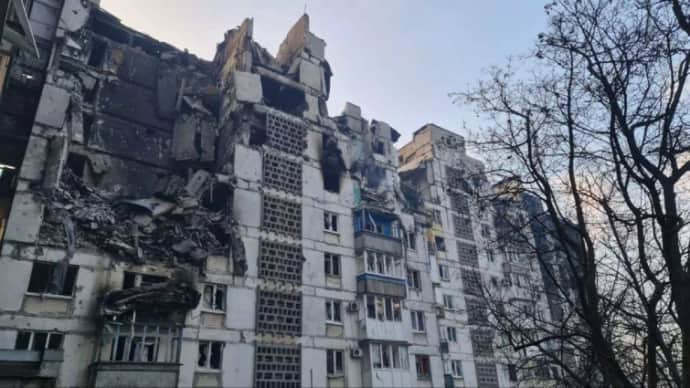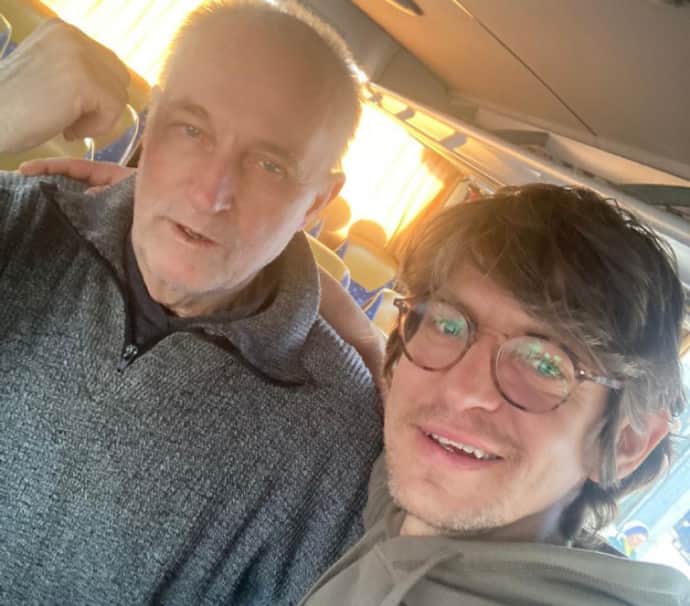A teenager distracted a guard so that the man could slip past. The story of an escape from Russian exile
The bombing of the high-rise building where he lived, weeks spent sheltering in a basement next to the Mariupol Drama Theatre, then deportation to Russia and escape to Estonia... You would think that Anatolii would have many memories from his long life, but it was in the 70th year of his life that he experienced the greatest hardships. Now he is safe, staying with his family in Khmelnytskyi Oblast.
A year ago, Anatolii's daughter and son-in-law had to plan a special operation to "abduct" him from the Russian city of Kazan, where the Russians had taken the elderly man from Mariupol by deception. ***
Advertisement:Anatolii had lived in Mariupol, where he worked in a factory, for over thirty years. "In 2014, Dad used to deliver baked goods and apples from his dacha to the checkpoints for our [Ukrainian] defenders," Anatolii's daughter Angela says affectionately. "He had a blue-and-yellow ribbon on his moped.
Dad was constantly worried that the pro-Russian people would tear the ribbon off, because they used to give him looks." Anatolii grew up in a Belarusian village on the border with Russia. Now he recalls how he used to fight with boys who came over from Russia to visit their relatives there.
"They were always making fun of the Ukrainian or Belarusian languages," he recalls. Anatolii's daughter Angela Hladkova and her husband Andrii Hladkov, who lived in Khmelnytskyi, in Ukraine's west, worried about him when the full-scale invasion of Ukraine began. They thought of Anatolii's political stance and the fact that he found it hard to get on with pro-Russian residents of Mariupol, and they tried to persuade him to leave Mariupol.
"But he flatly refused to leave," Angela says. "You see, people thought it would be just like in 2014 - there would be some shooting and then it would be over." Andrii says that he started insisting that his father-in-law leave the city, which caused an argument. On 26 February 2022, Anatolii stood in a long queue and managed to withdraw his pension from a functioning ATM on the left bank of Mariupol.
He lived in one of the most dangerous areas of the city. The bombardment was intensifying, and there were no evacuation notices or "green corridors" for safe passage out of his neighbourhood. On 2 March, the Hladkovs lost contact with Angela's father.
"We used to search through all the lists of the living, the dead, the wounded. We kept ringing all these institutions endlessly in the hope of establishing Anatolii's whereabouts. It was all in vain," his daughter recalls.
Anatolii managed to survive a week in his freezing cold apartment on Ukrainskoho Kozatstva Street with no electricity. Following an explosion outside his section of the building, the windows of his apartment were blown out. Anatolii asked a neighbour to take him in.
Around 10 March, the apartment block was attacked in an air raid.

The devastated apartment block where Anatolii used to live The neighbours said the attack was carried out by aircraft. Indeed, the intensity of the Russian air raids on residential areas in March 2022 was startling.
Anatolii himself is hard of hearing. He says he saw the warplanes and felt the vibrations as he walked around the city, but he almost never heard them. The people living in the damaged apartment block continued to cook outdoors, fetch water and warm themselves by the fire.
But after the airstrike, Anatolii and several neighbours decided to walk to the city centre in the hope of finding safety. Unable to contact their relatives, living in an information vacuum, people spoke little to each other. They were just trying to survive.
While the Hladkovs were beside themselves with worry and desperately searching for him, Anatolii set off on his travels. After walking for ten kilometres under fire, Anatolii and his neighbours ended up at Teatralna Square. First, they headed for the shelter of the Drama Theatre.
"Someone told us that there was no more room there. So we went on to another shelter nearby. God saved us," Anatolii says. "We didn't stay in that bomb shelter for long, because the doors were constantly shaking from the explosions, and there was almost no food." ["The Russian bombing of the Donetsk Academic Regional Drama Theatre in Mariupol on 16 March 2022 stands out as the single deadliest known attack against civilians to date.
An Associated Press investigation has found evidence that the attack was in fact far deadlier than estimated, killing closer to 600 people inside and outside the building" - Associated Press] There was a functioning radio in the shelter. From time to time, the young people were able to connect to mobile internet, and they learned that Ukraine was not lost, but was still fighting, and that they were a stone's throw away from the unoccupied parts of Zaporizhzhia Oblast.
"Someone told us that an evacuation to Zaporizhzhia was being organised at the exit from the city, so we decided to go there," Anatolii recalls. When they got to the PortCity shopping mall on Mariupol's outskirts, they saw buses and Russian soldiers. Anatolii says he asked the Russians if the buses were heading towards the Ukrainian city of Zaporizhzhia.
He was told they were. As the bus set off, Anatolii realised that they were heading towards the village of Nikolske, 20 kilometres west of the city. "I was thinking that if they were taking us to [Russian-occupied] Donetsk, I would jump out of the bus.
But when I saw that we were going to Nikolske, I calmed down. I have relatives there and I thought about staying with them," Anatolii says. But a few hours after arriving in the village, at night, the new arrivals were hastily bundled onto another bus and driven straight to the Russian city of Taganrog.
"It's painful for him to remember," says Anatolii's son-in-law Andrii. "It was so haphazard; they were moved during the night. He was already exhausted and in a state of shock. The Russians are just animals.
In Nikolske they told the people they had to wait for the paperwork, and they specially arranged this deportation during the night so the people would be even more disoriented." Anatolii says that when he boarded the bus that night, he asked a woman in civilian clothes several times if the bus was going to Zaporizhzhia and was assured that it was. The next morning, when he found himself in Taganrog, Anatolii was even more shocked.
"He was vulnerable, he started to feel scared," Andrii says. "In Taganrog, they were taken to the railway station almost immediately and put on a train. He didn't know where the train was going." Angela continues: "My dad only had a push-button phone, he didn't know how to use a smartphone.
We were lucky that a teenage neighbour was there too. When the teenager was given a Russian SIM card, my dad called me for the first time using the boy's phone." Andrii recalls that the call came around 2 April, a month since the family had started searching for Anatolii.
Anatolii was calling from the train. "He was very lost and scared. He was afraid to ask the conductors anything.
He told me they were being taken to Krasnodar [in Russia's south-west, on the Black Sea and close to Ukraine - ed.]," Angela recalls. At first the Hladkovs calmed down a bit, reasoning that Krasnodar was not that far away. But the deportees were being taken to Kazan, the capital of Tatarstan, 1,500 kilometres away.
"I guess my father-in-law didn't hear it quite right at first. And when he found out that they were being taken to Kazan, he despaired even more. He was crying," Andrii says.
Andrii gave his father-in-law instructions via his teenage neighbour's smartphone. "I told him to hide his passport safely and tell everyone that he had no ID, that it had been burned in his apartment. That's what he did, and that eventually helped get him out of there."
Eventually the Ukrainians were placed in a temporary detention centre in Kazan. Thanks to the teenager's smartphone, Andrii found out the exact address where they were being held. He also learned that people were only allowed out of the so-called hotel by handing in their ID, and that you had to leave your passport with a guard to go to the shop.
"This surveillance scared my father, but we had already sent Estonian volunteers to pick him up and were waiting for the right opportunity for him to escape," Andrii recalls. Andrii and Angela had found some volunteers who would get Anatolii out. The volunteers' car pulled up, and all Anatolii had to do was to go outside with his belongings and passport.
"He was afraid. He felt like he was in prison and that he would be captured like a criminal. We had to get the teenager to distract a guard, and eventually my father-in-law slipped through the exit," Andrii recalls.
Anatolii was taken to Estonia, and from there the Hladkovs received a long-awaited photo of him on his way to Ukraine. The pensioner had clocked up over 5,000 kilometres on his "travels".
 Anatolii (left) with a volunteer in Estonia
Anatolii (left) with a volunteer in Estonia
"He cried and rejoiced like a child, and he kept asking us to forgive him for not listening to us and not leaving Mariupol back in February," says Andrii as he recalls the reunion with his father-in-law. "Now we are getting him medical help.
We had to call an ambulance recently. Of course, these events have had a huge impact on my father's health. He always gets upset when these memories come over him," Angela says.
Now, Anatolii is waiting for Ukraine's victory. Every day he reviews the General Staff report and counts the number of Russian losses. He cherishes his dream of returning to Mariupol this summer.
This story was written as part of the Life in War project with the support of Public Interest
Journalism Lab and IWM.
By Viktoriia Novikova for Ukrainska Pravda.Zhyttia
Translation: Oxana Hart
Editing: Teresa Pearce